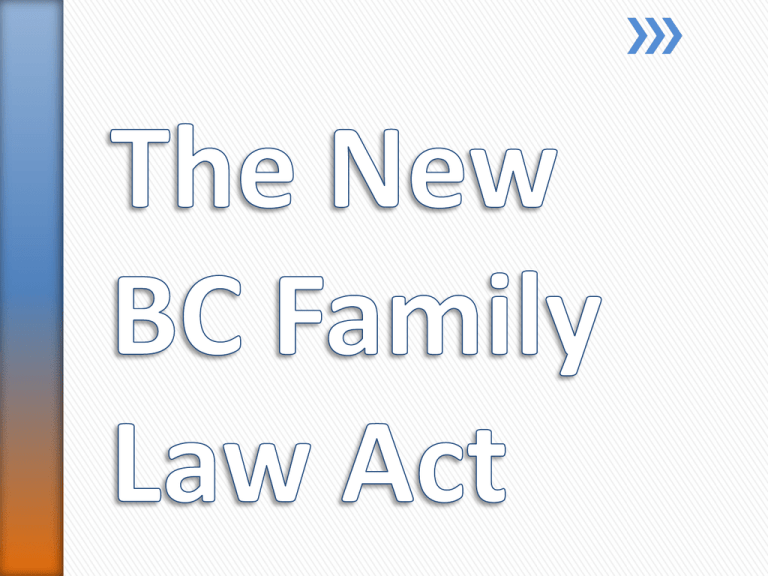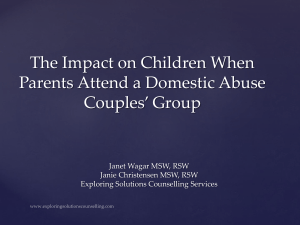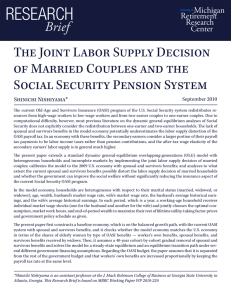The New Family Law Act in BC - Batchelor Stamm Law Corporation
advertisement

The new BC Family Law Act creates changes to family law in British Columbia. Some of these changes are significant and important to be aware of . What are some of the key changes to the law? • • • • • • The definition of Common Law couples Division of property and debt Child Support Relocation with Children Family Law Protection Orders Conduct Orders and Court Orders Common Law couples are included in the New Family Law Act Couples who live together for two or more years in a “marriage like relationship” are able to make claims under the new law. Claims are only valid up to two years after the couple stops living together. What kind of rights does this give to Common Law couples? • Property division • Spousal Support • Debt division » In the new act there are two types of property: 1. Family property (which is divisible) 2. Excluded property (which is not divisible) » Therefore, not all family based property is necessarily divided 50-50 as it was under the old law. Family Property » Any property that one or both spouse acquires while they are together » Any increase in the family property is divisible Excluded Property » Property acquired before the relationship » Gifts or inheritances » Settlements or compensation awards (exceptions) » Insurance policies (exceptions) » Property in a discretionary trust » Property held in trust for the spouse » Property gained from property or disposition of property Couples may opt out of certain aspects of the new Family Law Act with well written prenuptial or cohabitation agreements. The court will decide, based on fairness to all parties, whether the agreement should be upheld. » In some cases the court may now decide to divide property unequally (not 5050). The court will do this if it decides it would be “significantly unfair” to divide family or excluded assets equally. NOTE » Under the new act, family debt is also divided. Family debts are: • Debts which are owed when you separate • Debts which are taken on after separation to maintain family property » Debts are shared equally unless the court decides otherwise NOTE » Under the new law parents, step parents and even guardians must pay child support. There is a hierarchy of support: first parents, then step parents and lastly, guardians. » Child support still takes priority over spousal support. If you can only pay one, it will be child support. » The amount of child support paid by step parents may be determined by : 1. The length of time the child lived with the step parent; 2. What the living standard was while the child was living with the step parent. » The estate of the payor may have to continue to pay child support after death » Under the new Act, Children under 19 who willingly leave home or get married may not be eligible for child support, except in cases of domestic violence or intolerable living conditions. Changes to Spousal Support » Under the new Act spousal support extends to : • Married couples; • Couples who have lived together in a marriagelike relationship for at least two years; • Couples who have lived together in a marriagelike relationship for less than two years and have had a child together. Relocation: moving with your children. Your new responsibilities. » A relocation is any move that while have a “significant impact” on the child’s relationship with another guardian. » Under the new act, if you want to move your child you must give 60 days notice to the other guardian, unless a court says otherwise. » If the other guardian doesn’t agree to the move they may file an objection with the court within 30 days of being warned of the move. » The guardian who wants to move the child must show the court that they are doing so in good faith. » Good faith means there are legitimate reasons for the move, the move will not affect the child’s quality of life etc. » In cases where there is a risk of family violence, or where there is no relationship between the child and guardian, relocation notices may not be necessary. NOTE Family Law Protection Orders » Protection orders have taken the place of restraining orders under the new Act. » Protection orders limit contact and communication between parties if there is a risk of harm. » Protection orders protect people from family violence. » Violence can be physical, sexual or emotion. Violence also includes withholding the necessities of life or obstructing freedom » Protection orders are not enforced through the Act, but if you violate a protection order it is a criminal offense and the police can enforce it under the criminal code. NOTE » The new Act allows the court to create conduct orders, which are court orders to: • Help manage the court process; • Manage people involved in the court process; • Encourage dispute settlement Under a conduct order you can be ordered to: Attend a counselling session Attend a dispute resolution session Follow an existing court order Stop communicating with your spouse or someone else • Make payments on your family home » • • • • » Case management orders are court orders which may: • Cancel or dismiss a claim • Tell one party to not make any more court applications without the court’s permission • Dictate that future applications for orders must be made to same judge » All orders under the Family Law Act are enforced by the courts, except for family protection orders. Note » The court may enforce parenting orders by requiring make-up time with the child, ordering that a person attends counselling or ordering that one person pay another part for the breach of the order » To enforce certain orders the court may make a person: • Post bond • Pay a fine of up to 5000$ • Go to jail for up to 30 days











